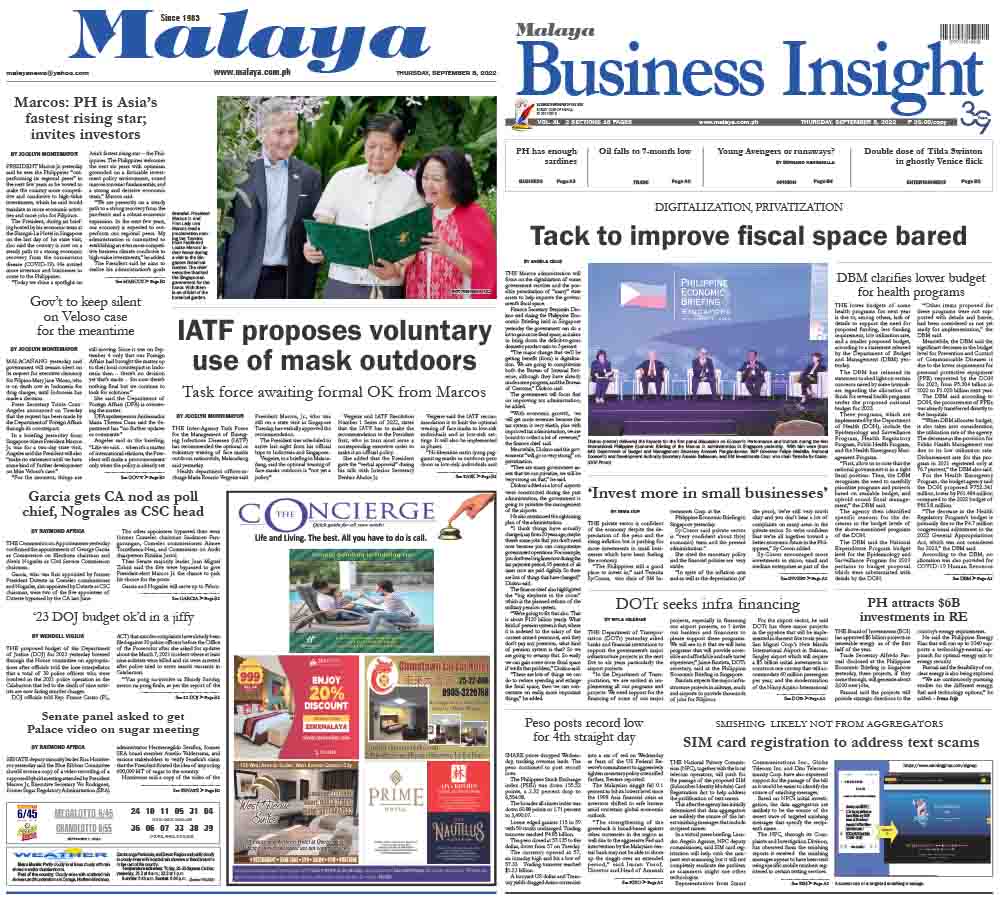GOVERNMENT auditors have raised questions on the P179.11 million food welfare supplies procurements of the province of Zambales last year, noting that the provincial government awarded contracts to distant suppliers even when local businesses offering lower prices were close by.
On the other hand, P85.923 million worth of medicines and medical supplies were delivered to public hospitals in the province even before the purchase orders were issued.
The audit team noted that three private suppliers — two in Bulacan and one in Metro Manila – won contracts from the provincial government despite their distance.
“Contracts thru NP [negotiated procurement] under the Bayanihan Act were awarded mostly to three private suppliers that are considerably distant from the province. Seemingly, the Bids and Awards Committee (BAC) failed to consider local supplier and farmers for the procurement of welfare goods,” the Commission on Audit said.
The audit report identified the contractors as Tagumpay Enterprises of Marilao, Bulacan which cornered nine transactions totaling P132.806 million; Diadema Enterprises of Barangay Central, Quezon City which was awarded three contracts worth P43.75 million; and LMVJ Trading of Pandi, Bulacan with four contracts amounting to P2.42 million.
A local business, Brisies Consumer Goods Trading of Botolan, Zambales ended up with one contract worth only P130,000.
Auditors noted that a purchase of 5,000 25kg sacks of rice went to a Quezon City-based supplier even if there were National Food Authority (NFA) warehouses in the municipalities of Iba and Castillejos.
“Inquiry with the audit team at NFA-Zambales Provincial Office revealed that the inventory of rice in its warehouses totaled 147,240 kilograms or equivalent to 5,889 sacks (25kg). Moreover, NFA rice is sold at a reasonable price of P25/kg which is far lower than the price of commercial rice at P44.80,” the COA pointed out.
Had the province bought from the NFA, it would have needed to pay only P3.125 million for the rice shipment or P2.475 million lower than the cost paid to its chosen supplier.
Likewise, the audit team found that payment to Diadema Enterprises totaling P36.996 million was released by the province to a different person without proper authorization.
The provincial government was warned that in the event that the supplier did not receive the amount, it could face legal problems for releasing payment to a person without a legal document showing he was authorized to collect.
Out of the P179.11 million worth of welfare goods distributed, the Provincial Social Welfare and Development Office (PSWDO) was only able to submit partial liquidation for P17.08 million or merely 9.54 percent as of March 10, 2022.
“Owing to the non-submission of liquidation documents pertaining to transactions amounting to P162,027,098.85, the validation of delivery and distribution of the said goods could not be made by the audit team,” the COA said.
The Governor’s Office was tagged as the one primarily responsible for the receipt and distribution of goods purchased. Among the supposed beneficiaries were front liners, fisherfolks, and teaching and non-teaching personnel of public and private schools.
However, a random sampling of 3,036 names in the list from three municipalities revealed only 1,808 or 59.55 percent were validated from the records of the Municipal Agricultural Offices (MAO).
In addition, 3,373 food packs released to the staff of the Vice Governor and members of the Sangguniang Panlalawigan mostly ended up with their neighbors.
“The majority of recipients are from where the officials reside, hence fair treatment to constituents was somehow compromised,” the COA said.
On the payment of P85.923 million medicines and medical supplies, auditors found that instead of processing through the General Services Office (GSO), the drugs and laboratory supplies were received directly by supply officers of four hospitals operated by the province.
A curious thing discovered by auditors showed deliveries were made three days to up to three months ahead of the award of any contract.
“For instance, the PO [purchase order] or contract for 600 vials of Remdesivir delivered on March 25, 2021 was only awarded to the supplier on April 28, 2021 or almost one month advance,” the audit team noted.
Provincial officials and hospital personnel claimed advance deliveries were allowed because during the pandemic, supplies were in great demand and there was a danger of shortage in case of delays.
They said they simply verbally contact the “usual suppliers” to deliver the goods even without the contracts.
The COA however said the practice runs contrary to the guidelines set by the Government Procurement Policy Board (GPPB) and COA Circular No. 2012-003.
“The payments for advance deliveries of goods and supplies are considered irregular expenditures,” the COA warned.





